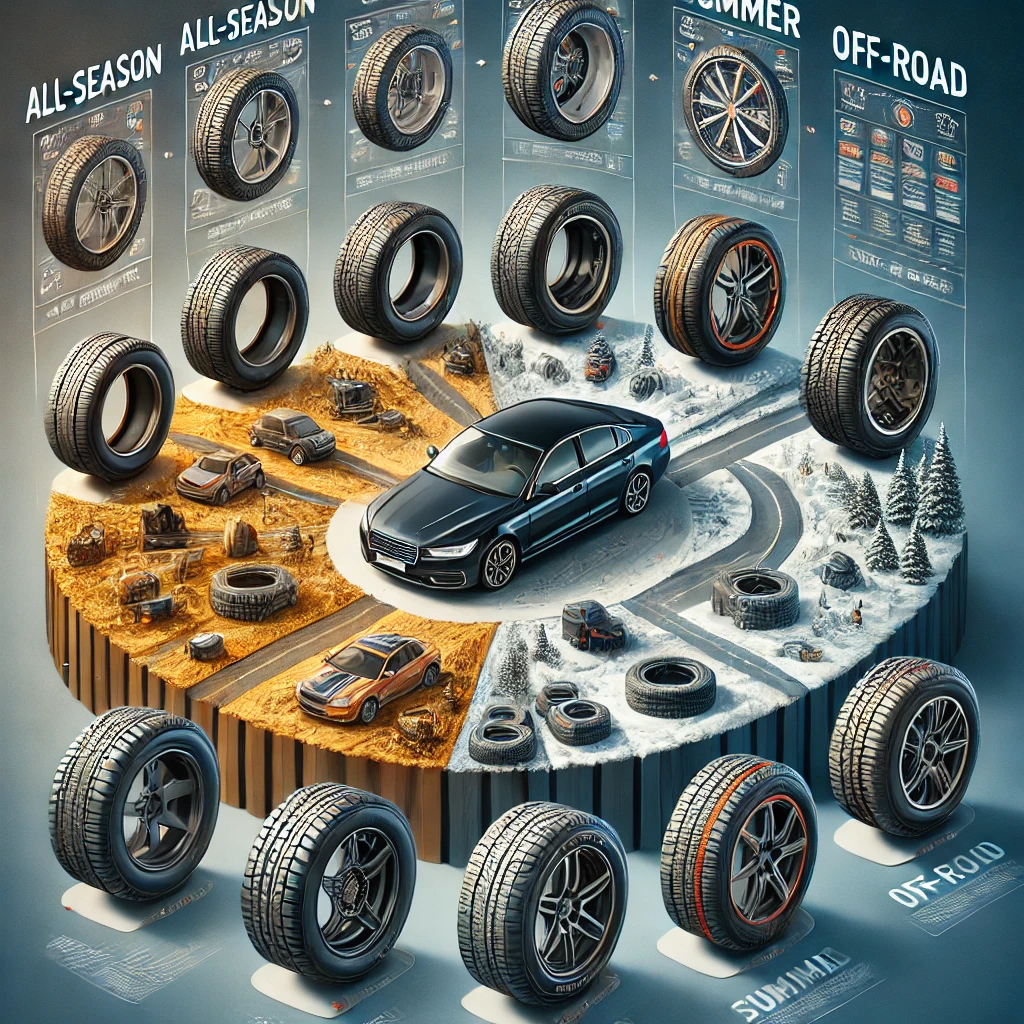
Choosing the right tires for your vehicle is more than just selecting something that fits. It’s about ensuring safety, optimizing performance, and enhancing your driving experience. Whether you’re navigating slick winter roads, rugged off-road trails, or just heading down the highway, the right set of tires can make all the difference. This comprehensive guide will walk you through everything you need to know about picking the best tires for your specific vehicle, driving habits, and budget.
Understanding Tire Basics
To begin with, understanding the basic structure of a tire is crucial. Tires are made up of several components, each contributing to their overall performance. The tread is the part of the tire that makes contact with the road, while the sidewall is the flexible outer portion that supports the tire. Beneath these are multiple layers, often called plies, that provide strength and durability. Understanding these components helps you appreciate why tire selection is critical for your vehicle’s performance.
Why the Right Tires Matter
Selecting the correct tires goes far beyond aesthetics or simple vehicle compatibility. The right tires will directly influence how your car handles, how safe it is on the road, and how fuel-efficient it can be. Worn or improper tires increase stopping distance, reduce fuel efficiency, and even decrease the lifespan of other vehicle components such as suspension and brakes. In extreme cases, poor tire choices can lead to accidents, especially in adverse weather conditions.
Types of Tires
One of the first steps in selecting the best tires for your vehicle is understanding the different types of tires available. Each tire type is designed with specific driving conditions and purposes in mind. Let’s explore some of the most common types:
- All-Season Tires: Suitable for year-round driving in moderate climates.
- Winter Tires: Designed for traction on snow, ice, and cold pavement.
- Summer Tires: High-performance tires that excel in warm, dry conditions.
- Off-Road Tires: Built for traction on unpaved surfaces like dirt, mud, and gravel.
- Touring Tires: Known for comfort and low noise, ideal for long-distance driving.
- Performance Tires: Tailored for enhanced grip and speed, perfect for sporty driving.
All-Season Tires: A Versatile Option
All-season tires are by far the most popular choice for many drivers. They are designed to perform well in a wide variety of conditions, making them versatile and convenient for everyday driving. However, it’s important to remember that while they are adequate in both wet and dry conditions, they may not excel in extreme weather, such as deep snow or intense heat.
Winter Tires for Cold Climates
If you live in a region that experiences harsh winters, winter tires are a must-have. These tires are made from a rubber compound that remains flexible at low temperatures, allowing them to grip icy roads more effectively than all-season or summer tires. Their deep tread patterns are specifically designed to channel snow and slush away from the tire, improving traction and safety.
Summer Tires: High Performance for Hot Weather
In contrast to winter tires, summer tires are built for warm weather and dry roads. They provide exceptional grip and performance during high temperatures, which makes them ideal for performance vehicles or regions where winters are mild. Their softer rubber compound and shallower treads increase handling precision but wear faster if used in colder climates.
Off-Road Tires for Rugged Terrain
For drivers who frequently travel on unpaved roads or rugged terrains, off-road tires are the go-to option. These tires have reinforced sidewalls and aggressive tread patterns to handle the demands of dirt, gravel, mud, and rocks. They are ideal for SUVs, trucks, and off-road enthusiasts who need durable and reliable performance in unpredictable conditions.
Tread Patterns and Their Impact
The design of a tire’s tread can drastically influence how it performs on different surfaces. For instance, symmetrical tread patterns provide a smooth, quiet ride and are common in all-season tires, while asymmetrical designs offer better cornering and handling. Additionally, directional tread patterns, which are found in performance or winter tires, are optimized for better water displacement and traction in one specific direction. Knowing the difference can help you choose the right tire for your driving habits.
Tire Size: Finding the Right Fit
One of the most critical factors in selecting new tires is making sure they fit your vehicle properly. Tire sizes are indicated by a series of numbers and letters on the sidewall. Understanding how to read these codes can make the tire-buying process easier. For example, a tire size might read “205/55R16,” which means the tire has a width of 205 millimeters, an aspect ratio of 55%, and is designed to fit a 16-inch rim. It’s important to always select tires that match your vehicle’s original specifications to ensure proper handling and safety.
By now, you should have a good grasp on the essentials of selecting the best tires for your vehicle. With the right tires, your car will not only perform better but also be safer and more efficient. Make sure to factor in the climate, driving habits, and your vehicle’s specific needs when making your decision. There’s no one-size-fits-all when it comes to tires, but with the right information, you can make the best possible choice.
You Can Also Read : How to Finance Your New Car Purchase Effectively
In conclusion, choosing the best tires for your vehicle requires a combination of knowledge, consideration of your driving habits, and an understanding of tire types and sizes. Whether you’re looking for all-season versatility, winter reliability, or high-performance summer tires, the right choice will keep you safe, improve fuel efficiency, and make every ride more comfortable. Take the time to research, compare brands, and consult professionals if needed, to ensure you get the best set of tires for your vehicle.